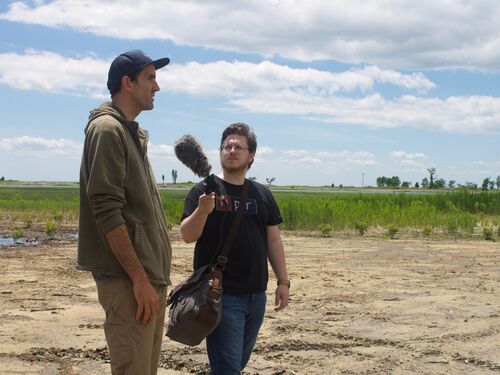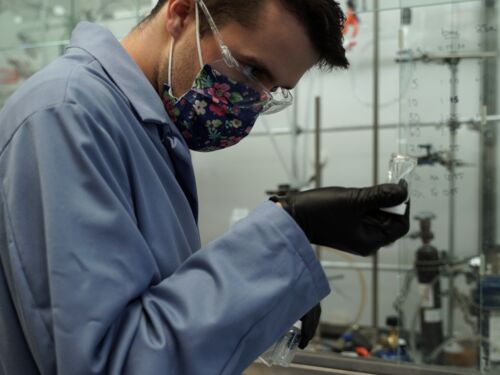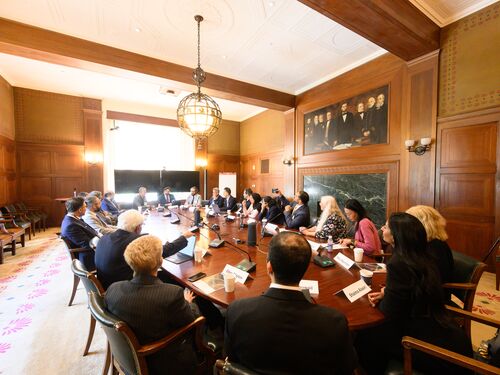Putting Games to Work in the Battle Against COVID-19
Feature Story
By Sara Frueh
Last update November 2, 2020
While video games often give us a way to explore other worlds, they can also help us learn more about our own — including how to navigate a pandemic. That was the premise underlying “Jamming the Curve,” a competition that enlisted over 400 independent video game developers around the world to develop concepts for games that reflect the real-world dynamics of COVID-19.
“Games can help connect our individual actions to larger-scale impact … and help translate data into engaging stories,” said Rick Thomas, associate program officer of LabX, a program of the National Academy of Sciences that supports creative approaches to public engagement.
Working with partners IndieCade and Georgia Tech, LabX brought Jamming the Curve to life over two weeks in September.
The “game jam” generated over 50 game concepts that drop players into a wide array of roles — from a subway rider trying to minimize the spread of infection among passengers, to a grocery store cashier trying to help customers while avoiding COVID-19, to a fox ninja tasked with dispensing masks to other forest creatures.
The five winning game concepts (see below) were announced at an award ceremony in late October, where each winning team was given a $1,000 prize and the chance to compete for a $20,000 grant to develop their game further.
The power of games
“Sometimes public health concepts can be a little dry,” said Carla Alvarado, a public health expert and program officer at the National Academies who served as a judge for the competition, during the awards ceremony. “Games package that information — it’s bite-sized, it’s digestible, and it’s palatable.”
And because games engage the senses and involve movement, they help people remember what they learn, she said. “That type of learning — experiential learning — helps retain a lot of the concepts.”
The idea of doing a game jam around COVID-19 began when Janet Murray of Georgia Tech reached out to Stephanie Barish and her colleagues at IndieCade about games’ potential to help express the complicated data around the disease. “Not everybody really knows how to look at that all of that information, and games are so wonderful at reaching people in ways that people understand,” Barish said.
Rick Thomas and the LabX team heard about the idea for Jamming the Curve and saw how they could contribute. The program had experience organizing other game projects around role-playing and storytelling — along with access to a range of scientists and public health experts through the National Academies’ networks.
“Given the high stakes of the topic around COVID-19 and the amount of misinformation around the pandemic, we really needed to make sure that we were doing this right when it came to creating these games,” said Thomas. LabX helped to recruit public health professionals involved in the COVID-19 response, as well as experts in science communication and risk perception, to serve as mentors to the game developers.
Play the Winning Games!
Trailers and some playable prototypes for the five winning game concepts can be found online:
Everyday Hero, in which players work to stop the spread of COVID-19 through measures such as social distancing and mask use
PandeManager, which gives players the job of a town’s mayor who must slow the spread of disease among citizens
Lab Hero, in which users play a first responder who is working hard to find a vaccine while following proper health protocols
Cat Colony Crisis, in which a ship of space-faring cats must deal with a mysterious disease outbreak
Outbreak in Space, which challenges players to save friends and family from a spreading epidemic in an alien world
All of the games submitted to Jamming the Curve can be found at itch.io.
The games needed to be fun as well as scientifically accurate — and so IndieCade, Georgia Tech, and Seattle Indies recruited gaming experts who could advise participants on how to make their creations engaging and easy to understand.
Mixing fun with learning
Finding that balance between enjoyment and learning was one of the main challenges of Jamming the Curve, said Patrice Metcalf-Putnam, a member of the team that created “Outbreak in Space” — a game that tasks players with containing an infectious outbreak in alien space town, factoring in issues like how long each resident has been infected and how much virus they are shedding.
“We didn’t want to create a game that was purely fun and simply virus-themed, for instance, or on the other extreme, we didn’t want to make a game that lectured to the player and was unlikely to change player behavior in the real world,” she said. “Ultimately, I think my team struck a good balance, and we were able to get players to think more deeply about their own behaviors and risks.”
Having science and gaming experts on hand to answer the teams’ questions helped, said Metcalf-Putnam. “The mentors were absolutely fantastic.”
Sylvie Garneau-Tsodikova, one of the science mentors and a professor of pharmaceutical science at University of Kentucky, was equally impressed by the game developers and the depth of their questions. “They took their work extremely seriously, and they really wanted to get it right.” She and her fellow mentors fielded questions about how the virus spreads, the degree of protection masks offer, and many other topics.
The game developers had access to another resource to help them make sense of the science — a simulation engine created by Georgia Tech that let them model how a virus spreads under different conditions.
When the two-week game jam ended, the game concepts were evaluated by a group of public health and gaming experts according to multiple measures: Was the COVID content accurate? How were the audio and visuals? Was gameplay accessible and fun? Using a rubric developed by LabX with the help of the Centers for Disease Control and Prevention, the judges selected winning games across five categories.
Growing the games, and their reach
The winning teams are now giving thought to how to develop their games further, and planning to compete for the $20,000 grant that would support their efforts.
Metcalf-Putnam and her team, for example, have ideas for improvements to Outbreak in Space. “There are some basic changes we plan to make for better usability, as well as expanding the gameplay options to promote more exploration.”
Chris Lyons, a member of the Ontario-based team that won an award for “Cat Colony Crisis,” said his team hopes to eventually make their game playable on mobile phones. “We think we can reach a wider audience that way, and that way we can release it for free and get it to as many eyeballs as possible.”
That goal — of reaching a wide audience, and ultimately changing behavior — is one of the motivations that drew Lyons and his team to participate.
“We’ve always been a very pro-science group of people, and it’s frustrating when you’re a team of pro-science people to see people in your community that won’t wear a mask and won’t follow social distancing guidelines and things like that,” he said. “It seemed like a good way to combine our skill sets with positive change we wanted to see in our community.”
“I’ve always believed that video games can be more than just something you do in your spare time — that they can really be used as a teaching tool.”
More like this
Discover
Events
Right Now & Next Up
Stay in the loop with can’t-miss sessions, live events, and activities happening over the next two days.
NAS Building Guided Tours Available!
Participate in a one-hour guided tour of the historic National Academy of Sciences building, highlighting its distinctive architecture, renowned artwork, and the intersection of art, science, and culture.



